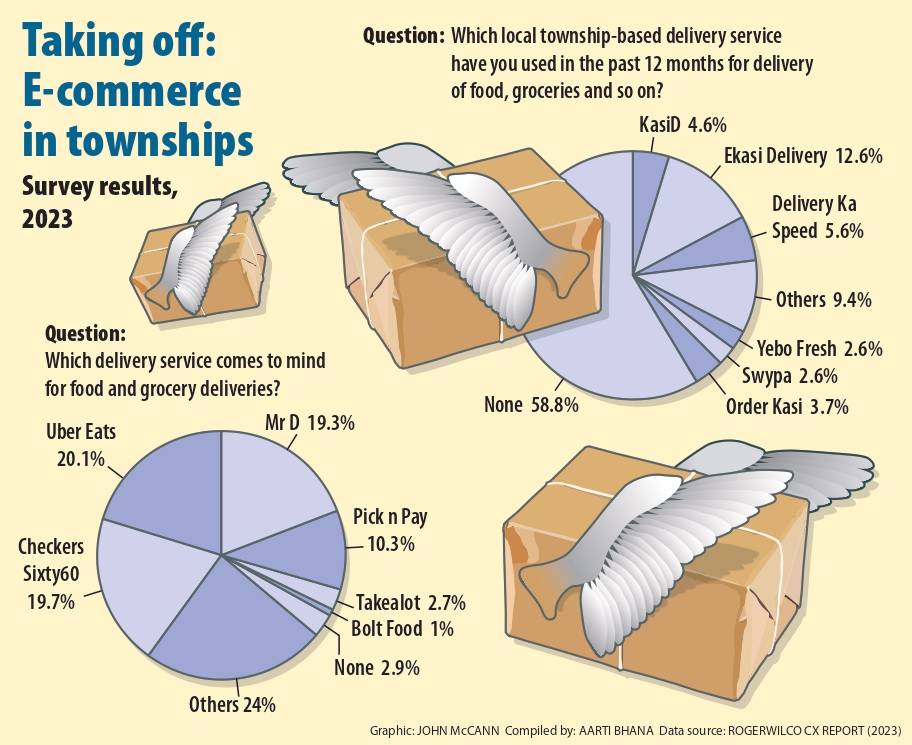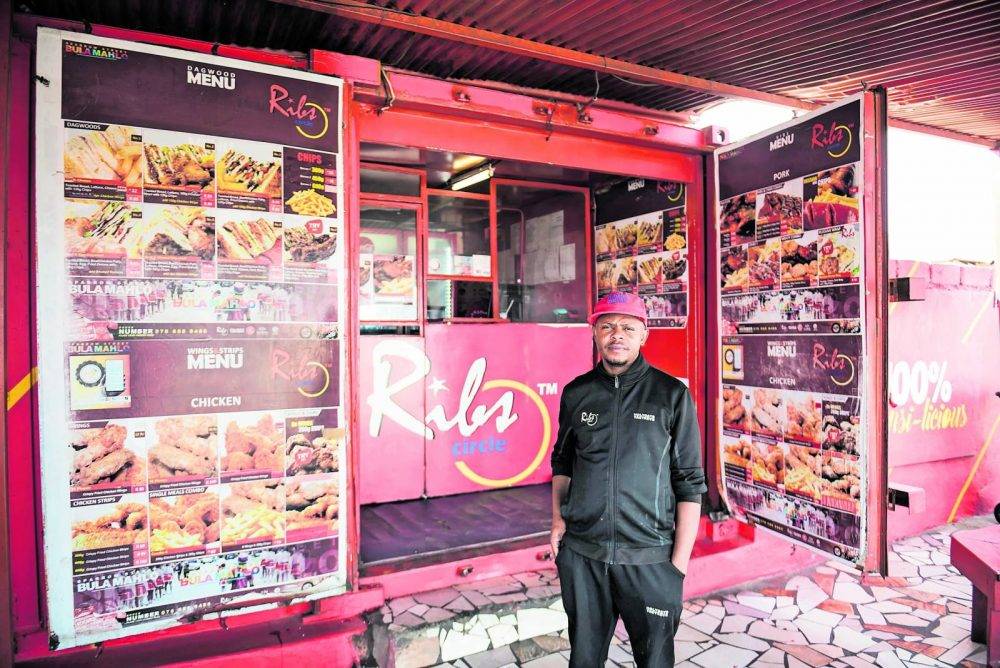Meals on wheels: KasiD delivery CEO Freddy Mahhumane and Lucky Mazibuko of the Ribs Circle restaurant in Tembis are positive about the food-delivery business in townships. (Delwyn Verasamy/M&G)
Lucky Mazibuko has been running Ribs Circle, a family-style fast-food restaurant in Tembisa, since 2016. It is one of the many semi-formal eateries in the township in the east of Johannesburg that has turned to e-commerce to boost business.
Before the arrival of the local e-commerce delivery app KasiD, Mazibuko’s customers would either call and then collect their food or sit in the restaurant to eat their meals.
In the two years since he registered his business on the app in 2022, his revenue has increased by roughly R25 000.
Mazibuko said there is a need for e-commerce in the township because it boosts the local economy: “It helps. It brings in that extra income.”
KasiD is an online food-delivery service that was born out of the need to service Tembisa residents. Chief executive Freddy Mahhumane said he started it because he wanted to access local cuisine, even after moving away from the township.
“When I was doing my research, I saw that companies, big companies, like Uber and Mr D, were pulling out from the townships and so I felt that had left a huge gap.
“They were saying their main concern was security, crime and so forth. Because I grew up here, for some reason, I felt safe in the township. I feel safer here than in the suburbs and I thought there must be a way to fix the security issue,” he said.
 (Graphic: John McCann/M&G)
(Graphic: John McCann/M&G)
KasiD started as a food-delivery business in 2022 with just 10 drivers. Slowly, Mahhumane expanded his operations into logistics and last-mile fulfilment and he now has 60 drivers on his books.
The township e-commerce economy is growing, according to the 2023 Township CX Report, published by digital marketing agency Rogerwilco, which found that the majority (60%) of respondents say they, or someone they know, have sold products and services online or begun working online.
In addition, 20% of respondents said they considered Uber Eats for grocery delivery, while Checkers Sixty60 came in at 19.7%, followed by Mr D at 19.3%, while Pick n Pay’s ASAP service attracted 10%.
This week, Shoprite announced its first venture into e-commerce for its Cash & Carry stores, with a bulk-delivery service for spaza shops and small businesses. The online shopping system provides free delivery to customers within a 50km radius.
Shoprite’s head of B2B e-commerce Mark Cotton said the initiative would support small businesses by “providing innovative solutions to the specific problems these enterprises face”, which include high transport and fuel costs and difficulties in meeting demand within the informal sector.
 KasiD delivery CEO Freddy Mahhumane. (Delwyn Verasamy/M&G)
KasiD delivery CEO Freddy Mahhumane. (Delwyn Verasamy/M&G)
Takelot.com, which owns Mr D, has also seen opportunity in the space, having launched six different programmes for entrepreneurs and communities in townships.
Tshepo Marumule, head of external affairs and public policy at Takealot, said these initiatives are aimed at encouraging people to spend their money on businesses where they live and where they work, while also getting more young people involved in the delivery services.
“An element of it is also about development; about getting more young South Africans to be drivers…There’s a mindset shift that needs to happen to ensure more South Africans can see it as an attractive proposition, something that they want, and that’s part of what we are doing as part of the township economies, so that more young people can make use of these employment opportunities or income-generating opportunities,” he said.
One of the initiatives that Takealot is rolling out in townships is a personal shopper programme in which purchases are made for members of the community.
Another is the Mzansi Trailblazer Restaurant Programme, which provides independent restaurants owned by disadvantaged entrepreneurs with trading benefits to boost their sales on the Mr D platform.
 Lucky Mazibuko of the Ribs Circle restaurant in Tembisa. (Delwyn Verasamy/M&G)
Lucky Mazibuko of the Ribs Circle restaurant in Tembisa. (Delwyn Verasamy/M&G)
The Rogerwilco report, however, points out that while the big e-commerce players have invested in becoming visible in townships, these areas have different needs to those of affluent suburbs.
It says township delivery services such as KasiD, Order Kasi in Cape Town, Delivery Ka Speed in Hammanskraal, and a number of others, were developed to fulfil those needs.
The township economy has high volume, but low income, and that makes it difficult to operate in, according to development economist Eddie Rakabe. “The emergence of this e-commerce market is still very small, and the reason is because of the low income levels but … [also] I think, because the culture of the market is still not necessarily inclined to do things online,” he said.
“It is a cash economy, where people prefer to go to buy things in a physical store … and there’s also proximity issues because the township is more concentrated.
“People will generally be closer to the markets. They will be closer to a shop where they can go and buy whatever they want, rather than order online.”
Diversifying the offerings would attract more customers, Rakabe said.
“The target market is traditionally based on food, groceries and, to a limited extent, hardware stores — all of those things. So, where I’m seeing opportunities really is in the food businesses.”
However, he said there were limits on the informal food enterprises operating in the township because there were additional requirements they had to fulfil to be listed on most established delivery platforms, such as Mr D and Uber Eats.
The local delivery services recognised this gap and have taken advantage of it by registering local formal and informal businesses on their platforms, such as KasiD.
“From early on, I wanted to compete with the big guns like Mr D and Uber Eats, so I made sure that I designed the technology to be at that level, if not better, with some of the unique aspects of the technology that we have in our app,” said Mahhumane.
To tackle the township safety issue, he decided to employ residents.
“My main focus was to hire local — that was the first strategy — and by local, I don’t mean South Africans, but I also mean the people that stay within the very same location, because when I was doing my research, I saw that all townships have different cultures, different languages, different food, different behaviour, different hotspots, and if people do not understand the hotspots, they will be easy targets,” Mahhumane said.
“We also strategised around the name to say, ‘Let’s find a name that a lot of people would relate to,’ and we went with KasiD.”
Mazibuko said he would welcome big players such as Mr D into the township economy because it would bring more business.
“It is competition. It might put them [KasiD] out of business but then, for me, if it’s giving me clients, then it is what it is. It’s business.”